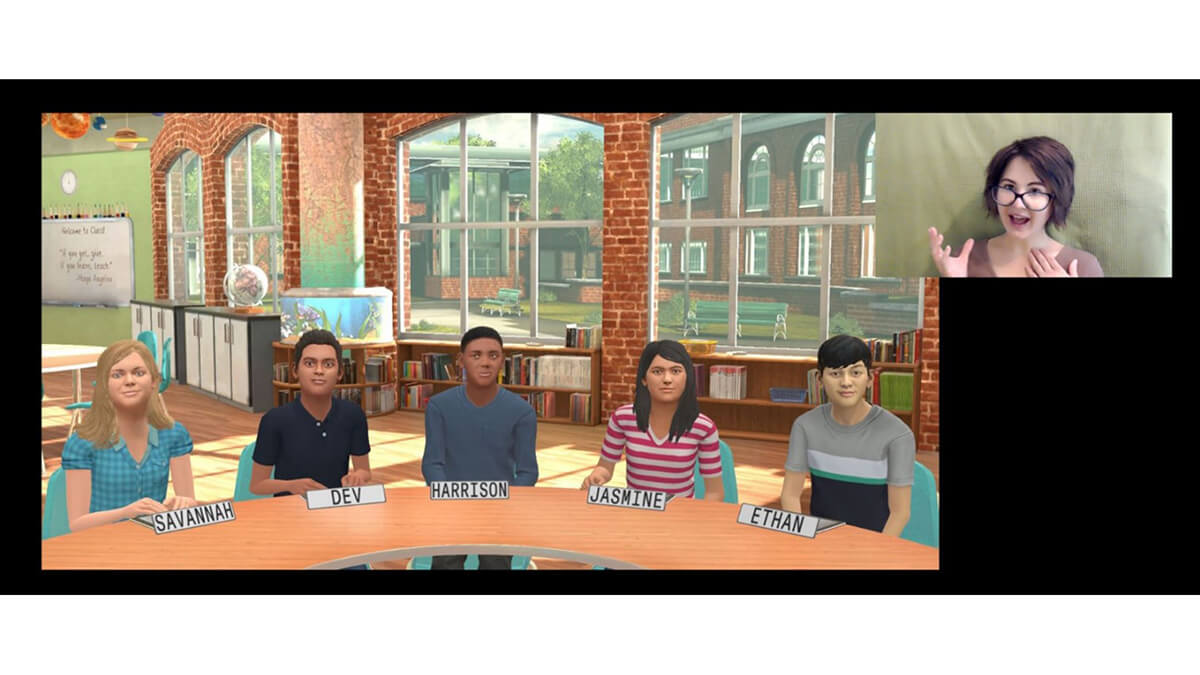Learn about the innovative course technology being offered in some of Walden University’s education degree programs.
Walden University is a great choice for working professionals who are looking to become a teacher or advance their teaching career. With education degree programs at the bachelor’s, master’s, and doctoral levels—including a BS in Elementary Education, MS in Education (MSEd), and Doctor of Education (EdD)—you can tailor your studies to align with your professional goals. What’s more is that each program is taught by faculty experts using the latest, cutting-edge technologies—like simulation experiences. To learn more, we sat down with members of the Walden Simulation Center and discussed how simulation experiences are being used to improve online learning for a number of programs, including those for teachers. Currently, simulation experiences are available in four of Walden’s programs: the BS in Elementary Education (Teacher Licensure), MS in Education (MSEd), Master of Arts in Teaching – Special Education (K–21), and Master of Arts in Teaching – Elementary Education.
What is a simulation experience?
According to David Dolinsky, educational media specialist, “In the simulation experience, you interact in a real-life situation with virtual avatars so that you can practice skills, strategies, and techniques in a safe environment. So, you’re not going to offend anybody. You’re not going to cross any HR lines. If you make a mistake, you’re not going to hurt somebody in education. You’re operating in a simulated experience so that you can get feedback, practice teaching strategies, and then apply what you learn.”
Are the avatars real people?
The simulation experience has several layers to it. First, the software itself is controlled by a real person—a simulation specialist. In addition to being well-trained and vetted, these specialists often come from acting or improv backgrounds. Each simulation experience—or scene—has a different storyline. And the outcome of each storyline (called a protocol) differs depending upon what skills the student is expected to demonstrate. Because of this, it’s crucial that simulation specialists are able to improvise in response to changing behaviors and interactions throughout the story.
How are the storylines developed?
We have a team of specialists who work with the academic team to build each storyline based on the various skills we want our participant or student to demonstrate or to experience. Students develop their skills by engaging with the learning resources and assignments within their online course. Through the simulation experience, students put theory into practice and demonstrate these skills.
Can students take the simulations at any time?
No, students schedule their simulations via an online calendar, choosing a convenient day and time within a specified time frame to allow them to complete the simulation as part of a course assignment or discussion. When they are finished, a video of the simulation experience is sent to them, and they may be asked to share it with their instructor or engage in peer feedback with other students in their course.
Why are simulation experiences important for individuals pursuing their education degree at Walden?
Simulation experiences allow online learners to practice teaching strategies and skills prior to entering an actual classroom. They offer an interactive, immersive environment where participants can comfortably develop the skills they need to excel as an educator. “Simulation experiences serve as a first step into providing a tangible experience,” said Walden Acquisition and Engagement Manager Christopher Martin. “They give our students hands-on learning that aligns with what we've built into class instruction.”
Kelli Bowerman—acquisition and engagement manager at Walden—spoke to how much safer it is for education degree-seekers to initially interact with virtual avatars as they hone their skills in teaching. “It creates a no-judgment zone in which to learn, and I think that allows you to be more comfortable. It allows you to enhance your skills without anybody being in harm. It’s the concept of ‘practice makes perfect’ in a safe environment.”
Martin adds, “I love the tangibility and the real-life feel to it. We know that educators are passionate about supporting and helping students. So, providing a way for these Walden degree candidates to comfortably and safely practice different classroom scenarios … well, that’s where it really hits home.”
Pursue Your Teaching Degree at Walden University—the Educator of Educators®
Getting your bachelor’s, master’s, or doctorate in education can open the door to a fulfilling teaching career. And with Walden’s online education platform, you can complete coursework for your BS in Elementary Education, MSEd, EdD, or other education degree program from wherever you have internet access. You can also attend class at whatever time of day works best for you—a convenience that makes it possible to earn your education degree while you continue to work full time. Enroll in one of Walden’s online education programs and develop the knowledge and skills you need to enhance your influence as an educator.
Walden University is an accredited institution offering a suite of education degree programs online, including BS in Elementary Education (Teacher Licensure), MS in Education (MSEd), and Doctor of Education (EdD) programs. Expand your career options and earn your degree using a convenient, flexible learning platform that fits your busy life.
Walden University is accredited by The Higher Learning Commission, www.hlcommission.org.




